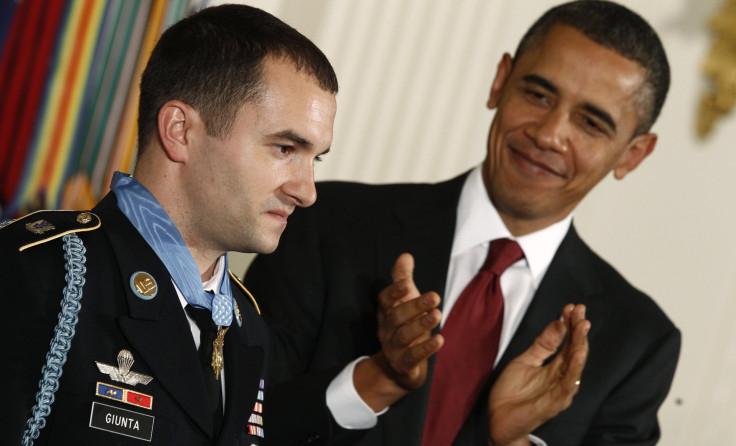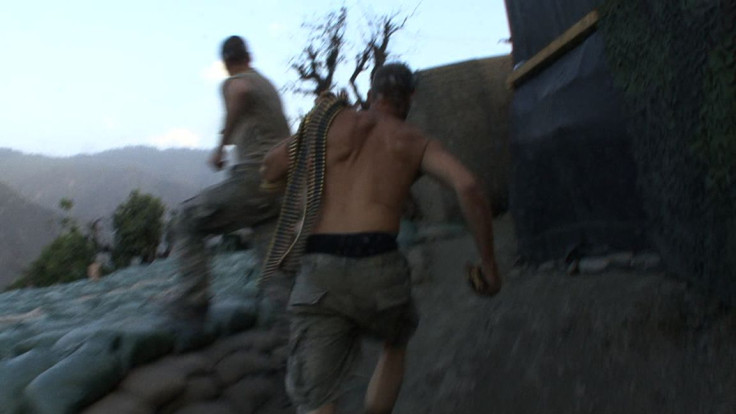New Documentary About Afghan War Focuses On Soldiers' Hearts And Minds

Midway through Sebastian Junger’s new documentary film about U.S. soldiers fighting in Afghanistan, Sgt. Brendan O’Byrne wonders aloud if God hates him for what he’s done.
“I’m not religious or anything,” O’Byrne says, in a halting voice, “but I felt like there was hate for me, because I did … sins. I sinned. And although I would have done it the same way – everything the same exact way, I still feel this way.
“That’s the terrible thing with war -- you do terrible things, then you have to live with them afterwards. But you’d do it the same way if you had to go back.”
O’Byrne’s on-camera confessional is not the kind of commentary one expects to hear from a soldier in a documentary about war. There is no bravado, only brutally honest introspection – and the voice of experience. That is one reason Junger’s latest film, “Korengal,” is so compelling. War is devastating in myriad ways, some of which civilians can only imagine.
“Korengal,” which opens nationwide at New York City’s Landmark Sunshine Cinema on May 30, is a raw, unflinching look at war from the perspective of a group of soldiers at a remote outpost known as Restrepo in eastern Afghanistan’s Korengal Valley. Over the course of a year, the film follows the soldiers through their daily experiences -- hooting in glee at the sight of Taliban enemies being shredded by bullets, crying over lost brothers, playing Guitar Hero, wondering aloud about the meaning of courage and talking frankly about what goes through their minds under incoming fire.
More so than Junger’s 2010 Oscar-nominated documentary, “Restrepo,” which he and the late photojournalist Tim Hetherington directed and produced about the same platoon, also at Outpost Restrepo, “Korengal” focuses on the inner landscape of war. Whereas “Restrepo” was an experiential film meant to put the viewer in the center of the action, with no musical soundtrack or voiceover, “Korengal” strives to explain and reveal the emotional impact of the war on the soldiers fighting it.
“‘Korengal,’” Junger said, “is not so much for civilians as it is for the soldiers. We wanted to make a film that allowed the soldiers to work through their experiences, and by extension, give civilians a chance to understand. When I ask a soldier what courage means to him, it gets illuminated for the rest of us.” The reason, he said, is that everything is writ large in a time of war.
The film's impact was made clear during a showing at the Little Rock Film Festival on May 17. Jason Mace, a veteran of the platoon who participated in a Q&A after the show, said the audience included an elderly World War II and Korean War vet who had to be supported as he walked, who said he’d never talked about his war experiences with his family but that after watching “Korengal” and seeing the soldiers open up, he felt that he might be ready. “What do you say to that?” Mace recalled with a certain awe.
In his director’s statement for the Kickstarter campaign that helped fund the film, Junger said he hoped to find answers to fundamental questions about armed conflict, including: “How does fear work? What do courage and guilt mean? What is it like to come home from war? Why do so many soldiers miss being at war once they’re home?”
If those questions sound lofty, the film is anything but. There is soul-searching at Restrepo, but no navel-gazing. Poignant revelations come amid moments of visceral combat drama.
“Korengal” is a departure from Junger’s previous two documentary films in the way it's being marketed and distributed. Junger and Hetherington, who was killed in a mortar attack in Misrata, Libya, in April 2011, self-funded the editing of “Restrepo,” which relied upon footage they’d gathered while on assignments in the Korengal Valley for “Nightline” and Vanity Fair magazine in 2007-2008. Both the editing and the distribution of “Korengal” are being self-financed, the latter through what Junger calls the “Louis CK model,” in which the comedian streamed his self-produced stand-up special on his own website for $5, without a distributor or television network; by eliminating the middle men, Louis CK reportedly earned $1 million.
Junger and co-producer Nick Quested of New York/London-based indie Goldcrest Films are distributing “Korengal” without a major studio’s or network’s backing, relying instead upon their own funds and the Kickstarter campaign, which drew from the large “Restrepo” fan base (more than 200,000 Facebook followers) to raise $80,000 within its first 48 hours and more than $100,000 total. Self-funding gave Junger greater artistic control, which he said enabled him to remain faithful to the soldiers’ vantage point.
There were a few challenges to self-distribution, he noted, including the logistics of buying out dozens of theater venues, garnering critical reviews and spreading the word on social media. But it made more sense than submitting to the studio or network system, he said.
“It’s really rare for filmmakers to be able to launch a film on their own,” he said. “But if you have some working capital and a fan base, you don’t need a distributor or broadcast TV anymore. Five years ago that wasn’t possible, but social media is an enormous actor now, as is Kickstarter. In a hundred small ways it’s easier for the filmmaker.”

Junger’s next film, “The Last Patrol,” will air on HBO this fall, and his two previous documentaries (“Restrepo” and “Which Way is the Front Line From Here? The Life and Time of Tim Hetherington”) were distributed by National Geographic and HBO, respectively. But he said he’d consider going the Louis CK route again if the material was suitable, and assuming “Korengal” succeeds.
The first commercial opening will be in New York, after which the film is scheduled to show in theaters in 20 cities nationwide. Landmark has said that it will add more cities if the response is strong in New York. Many of the venues are near military bases, and Junger is relying upon Battle Company veterans to handle audience Q&As. Mace, who participated in the Little Rock Q&A with fellow Restrepo veteran Michael Cunningham, said the conversation there included perhaps 100 audience members and got so intense that it afterward spilled into the theater’s lobby and continued at a festival party and at a nearby bar until 5 a.m.
“One reason the Q&A went so long is that Michael and I didn’t hold back on the questions,” Mace said.
Also in the audience were several veterans who had replaced the Battle Company soldiers when they departed the Korengal. “They’d never really talked about their emotions – most soldiers don’t,” Mace said. “But [at the Q&A] we had to, because it’s out there in the open now.”
Asked why normally reticent, media-wary soldiers would bare their souls for Junger and Hetherington, Mace said, “We felt kind of obligated to. Sebastian and Tim put their lives at risk to tell our story … They became a part of our brotherhood.”
O’Byrne, who appears in all four of Junger’s documentaries as well as his book “War,” and who will participate in the Q&A after the New York screening, said watching the film was therapeutic for him, too. “‘Restrepo’ and ‘War’ helped me understand what was going on inside me,” he said. “Even really strong soldiers have PTSD and have doubts in their brain about what they did over there. The feeling was, ‘Let us explain to ourselves how we deal with it.’ ‘Restrepo’ is a physical movie. ‘Korengal’ is more a mental movie.”
Like many of the soldiers in “Korengal,” O’Byrne said he missed combat after his 15-month tour was over. In war, he said, “Everything is real. You feel purpose, this connection. In society, everyone looks posed. The only real reason we’re on earth is to make serious, meaningful connections, and when you develop that kind of bond, you miss it when it’s gone.”
Junger said he made “Korengal” because so much powerful material remained after “Restrepo” was finished. He and Hetherington knew they had more than enough material for one film while they were making “Restrepo,” and discussed making a sequel or perhaps a three-part series before Hetherington died. Most of the footage was shot by Junger and Hetherington during their month-long sojourns at Restrepo, though “Korengal” also incorporates archival news clips, footage captured from the Taliban and footage shot by the soldiers themselves (who were technically the 2nd Platoon of Battle Company, 2nd Battalion, 503rd Infantry regiment of the 173rd Airborne Brigade). The journalists' time at Restrepo also resulted in Junger's book “War” and Hetherington’s photo-essay book “Infidel.”
Watching the current film, it is easy to understand why the journalists did not consider “Restrepo” the end of their cinematic saga. At the start of “Korengal,” we see then-Pvt. Misha Pemble-Belkin talking about the Oregon mountains where he grew up and explaining how during low moments in the Korengal his mind drifted back home, in search of “something peaceful, something nice.” Later, when Pemble-Belkin is on leave in Italy, Junger asks him if he perhaps misses anything about Afghanistan, and he says, “I’d rather be there than here. I’d go back right now if I could. I’d go back to the Korengal right now.”
Mace said that after the Little Rock screening, he and Cunningham were asked their best and worst memories of their time in the Korengal. Cunningham answered that his best memory was when the men received their combat infantry badges (a recognition that they’d been shot at and had returned fire – an important milestone for an infantryman), after which he enjoyed spending time with his roommate, company medic Juan “Doc” Restrepo, who’d been away for a while. “They hadn’t seen each other in weeks,” Mace said. “They talked about how much they missed each other. And the next day, Restrepo was killed. It was kind of a goodbye without realizing it. So that was the best and then the worst.”
The best and the worst were often in close proximity in the Korengal. The stunning scenery was riddled with hidden, deadly enemies. Adrenaline rushes were interspersed with long bouts of boredom. Soldiers were forced to coexist with others whom they couldn’t stand, yet who would die for them. As specialist Sterling Jones explains in “Korengal,” “Here I am – unfortunately and fortunately, all at the same time.”
Watch the trailer for "Korengal" here:
© Copyright IBTimes 2024. All rights reserved.






















